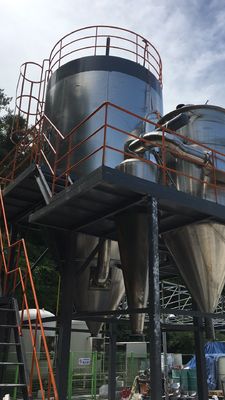Atomizer High Speed Centrifugal Spray Dryer In Ceramic Industry Plant Extract 50L Stainless Steel
| Name | Plant Extract Spray Dryer Machine | Material | SUS304, SUS316L, Ti |
|---|---|---|---|
| Max. Water Evaporation Capacity | 200kg/h | Heating Method | Electricity + Steam, Fuel Oil, Gas, Up To The User. Applications: Plant Extract Processing, Chemicals Processing, Plastics Processing, Food Processing, Etc. |
| Warranty | One Year | Applications | Plant Extract Processing, Chemicals Processing, Plastics Processing, Food Processing, Etc. |
| Inlet Temperature (℃) | 140-350 ℃ | Out Temperature (℃) | 80-90 ℃ |
| Spray Type | High Speed Centrifugal Atomizer | Transmission Form Of Centrifugal Spray Head | Mechanical Transmission |
| Atomization Rotated Speed (RPM) | 11800 | Spray Disc Diameter (mm) | 210 |
| Electric Heating Maximum Power (KW) | Customized | Voltage | 110V220V/380V/440V/Customization |
| Dimensions (L×W×H) Mm | Customized | Dry Powder Recovery | ≥95% |
| Core Components | Bearing, Pump, Gear, Motor, Gearbox, PLC, Engine | Use Purpose | Lab Or Pilot |
| Highlight | spray dryer in ceramic industry,Centrifugal Spray Dryer Plant Extract 50L,High Speed Centrifugal Atomizer Spray Dryer |
||
8.Plant Extract Spray Dryer Machine
Product Description
Spray drying process is the widest used in the liquid forming process and in drying industry. The drying technology is most suitable for powder, particle products from materials, such as, solution, emulsion, SC and pumpable paste states material. For this reason, when the particle size and distribution of the final product, their residual water contents, the stacking density and particle shape must meet the precision standard, spray drying process is one of the most desired processes.
LT-Series high-speed centrifugal spray dryer for plant extraction is the technology most widely used in the drying industry. It is most suitable for producing powder products from plants, when the particle size and distribution of the final products, residual water contents, mass density and the particle shape must meet the precise standard, spray dryer drying is one of the most desired technologies.
LT-200 plant extract spary drying equipment adopts PLC automatic control. All operations are completed automatically according to the process parameters set by users. It fully meets the requirements for plant extract processing production in GMP.
Technical Specifications of Seafood Spray Dryer
| Model | LT-200 |
| Max. Water Evaporation Capacity (kg/h) | 200kg/h |
| Material | SUS304, SUS316L, Ti |
| Inlet Temperature (℃) | 140-350℃ |
| Out Temperature (℃) | 80-90℃ |
| Spray Type | High Speed Centrifugal Atomizer |
| Applications | Plant extract processing, chemicals processing, plastics processing, food processing, etc. |
| Transmission Form of Centrifugal Spray Head | Mechanical transmission |
| Atomization Rotated Speed (RPM) | 11800 |
| Spray Disc Diameter (mm) | 210 |
| Heating Method | Electricity + steam, fuel oil, gas, up to the user. |
| Electric Heating Maximum Power (KW) | Customized |
| Dimensions (L×W×H) mm | Customized |
| Dry Powder Recovery | ≥95% |
Main Features
* Drying speed is very fast;
* Product has good dispersibility, fluidity and solubility;
* Production process is simplified, easy to operate and control;
* The air drying chamber wall of the drying chamber is used to eliminate or reduce the stick wall phenomenon;
* Drying chamber wall and roof top adopt air cooling system to prevent material from melting hot wall;
* The powder collection system uses dehumidification air cooling technology to prevent moisture absorption and agglomeration of the product and facilitate product packaging;
* Meets the requirements of GMP national standards, and the air cleanliness of contact with materials reaches.
Application Field
* Chemical Industry: Battery raw materials, basic dye pigments, dye intermediates, compound fertilizer, formaldehyde silicic acid, catalyst, sulfuric acid agent, amino acids, white carbon black, etc.
* Plastic Resin: AB, ABS emulsion, urea-formaldehyde resin, phenolic resin, dense adhesive (urea) formaldehyde resin, polyethylene, polyvinyl chloride and so on.
* Food Industry: Milk powder, lentil, cocoa milk powder, animal blood powder, egg white (yellow) egg powder, etc.
* Food and Plants: oats, chicken juice, coffee, instant tea, flavoring meat, protein, soybean, peanut protein, hydrolysates, etc.
* Sugars: Corn pulp, corn starch, glucose, pectin, maltose, potassium sorbate, etc.
* Ceramics: Alumina, ceramic tile materials, magnesium oxide, talcum powder, etc.













